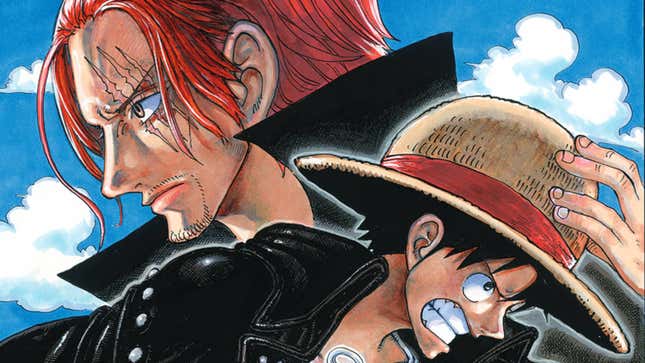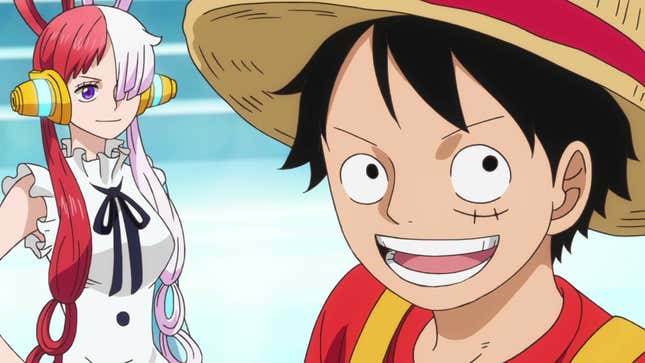
What a world. A One Piece movie about a pop star was one of the highest-grossing anime films in Japan earlier this year. Just released here, I watched One Piece Film: Red during its debut weekend to see what all the hype was about. I was blown away by the film’s bombastic style and emotional storyline. So of course I grabbed our resident One Piece evangelist, Isaiah Colbert, to talk about the biggest anime movie of the year.

Isaiah Colbert: So, my first weeb question for you as a born-again One Piece fan is did you watch One Piece Film: Red dubbed or subbed?
Sisi Jiang: I watch everything subbed. Sometimes it’s for anime elitism reasons, but I’m also just very particular about being able to catch every word on the screen. I’d watch more dubbed movies if they gave me the subtitles anyway! That was the right call because that was the most obnoxious theater I’ve ever been in. People jumping out of their seats, hooting and hollering, or talking over the film! One guy beside me actually started blowing his nose at the end.
Isaiah Colbert: Ah, a person of culture. I see. I also watched it subbed but that was mostly because the only screenings me and my fellow One Piece degenerates could make was a late subbed screening. I’m surprised your screening was so rambunctious! My theater was mostly empty apart from my friends and like a handful of other people. I know I’ve been slowly infecting the office with my Jehovah’s Witness-style One Piece proselytizing so I was wondering if this your first ever One Piece movie, and if so, how’d ya like it?
Sisi Jiang: Never mind the movies. I haven’t even seen the anime since the Baroque Works arc [originally released in 2001-2002]. I just find the animation to be kind of bland looking? Even the newer stuff seems like it’s just representing the manga plot instead of developing its own visual style like the Demon Slayer anime or Jujutsu Kaisen. So I went into One Piece Film: Red with very low expectations.
And there are moments when I compared it unfavorably to Demon Slayer: Mugen Train, but I actually think Red mitigates a lot of my complaints about animation quality by being so damn stylish. I’m glad that the series creator Eiichiro Oda took a more active role in producing the film, because his art style is very good at unifying completely disparate visual elements without being hyper realistic.
Isaiah Colbert: True true, this was my second time watching a One Piece film in theaters, my first time being Strong World’s rerelease last year. While it took me a second to get acclimated to Film Red’s Hatsune Miku-style 3D animated scenes during Uta’s performances, I was completely on board thanks to the fact that each of her songs are bangers, and because of how she ties into Luffy’s story. While most anime tie-in movies feel shoe-horned into the grand mythos of a series, I think Film: Red’s story actually works better as a film, nicely coinciding with the anime’s Wano arc. Especially since Oda confirmed that Uta is canon within the One Piece mythos. Plus getting more of Shanks the absentee-father is greatly appreciated.
Sisi Jiang: Oh yeah, one of my favorite narrative choices in the movie was how it didn’t simply tell us that Uta was adored—it made us fall in love with her at the beginning. One of my gripes is when a work features a cutesy female protagonist, and then I’m told that she’s important and beloved without having me experience that as an audience member. But I was ready to die for her by the third musical number. Which made it easier for me to accept that so many of her fans were on board with what she was doing. And my adoration carried over even during her heel turn and subsequent antagonist role. That was a bold writing decision that helped her not feel like a disposable movie villain.

Isaiah Colbert: For sure! I was wondering why I hadn’t seen a lot of scuttlebutt in trailers and forum posts about the movie’s villain but the revelation that Uta was turning her “forever concert” into Fyre Fest’s wet dream made a lot of sense to me after she basically called out how that pirate life isn’t so sweet for the folks on the ground that have to deal with the consequences of the pirates’ Earth-shattering battles. Her methods for fulfilling that dream are another matter. But whenever she turned on a dime and made a cute face while teasing Luffy, she shifted from a Wanda Maximoff-type villain into the hallowed “morally gray” category. Plus I think it’s really interesting to have her take on the role of the siren in seafaring mythos.
Sisi Jiang: You know, I have a lot of complicated feelings about her. Uta is clearly a genius, and her talent is what compelled even good people like both of her adoptive fathers to make excuses for her. Their well-intentioned lies actually hurt Uta more and enabled her to almost wipe out the world. Like I was sitting in the theater and thinking of Kanye West. He’s hurt a lot of people even before this year, but many fans have papered over his flagrant bigotry because he’s a musical genius. We’re all complicit in creating powerful idols, and I really appreciated that Red took this theme seriously.
Obviously it’s not a one-to-one comparison because Luffy actually has a personal relationship with Uta while we’re all just having parasocial relationships with celebrities. But while I watched her subsume the world, I caught myself thinking, “I support women’s rights and women’s wrongs.” But should I? It didn’t matter. I wanted to, because that’s the power of idolatry.
Isaiah Colbert: Uta was like “I made Tot Musica, I’m never going to hell.” And that’s the thing about One Piece I’ve always appreciated. While the show could’ve been a mindless adventure anime and left it at that, it often goes beyond that by diving into how different systems of oppression shape the worldview of the show’s many heroes and villains, and sometimes takes them to task for their beliefs. While most situations are clear-cut, like the Celestial Dragons being terrible people for their rampant slave trade, One Piece also sometimes calls into question our preconceived notions of its villains’ prejudices, like we see with Arlong.
Sisi Jiang: Oh for sure, One Piece is dead serious about how both the powerful and the powerless have their roles in maintaining systems of oppression. But I feel like Red dropped the ball in some areas. For one, I disliked that Uta’s utopia was portrayed as a peaceful world but people aren’t allowed to have jobs and their happiness is extremely shallow. Why not have world peace that’s productive and the drawbacks are relatively negligible? I also see this problem in the Fate series and the last semester of Persona 5 Royal. It’s always a choice between a violent world or a meaninglessly sedate one. And while I did like that her personal trauma was linked to why she became a villain, I felt that it cheapened her convictions, because then she’s made out to be an emotional woman who did everything out of guilt rather than moral fiber. Shanks didn’t burn down the island? Fair. But what about the violent pirates who are like Arlong? Uta had actual points in the beginning, and the ending threw that away.
Isaiah Colbert: That’s fair. I had the niggling thought the entire time I was watching the film that this is what conservatives think whenever liberals bring up communism, in that it’s idealistic in concept but bound for failure in the long run. Also didn’t help that both the older generation and “worst generation” of pirates, Shanks and Luffy, stonewalled Uta by saying that a peaceful world without pirates can’t exist. Which definitely kills the meme of the One Piece being the friends you made along the way dead in the water.
Sisi Jiang: Yeah, I think it’s possible to have a peaceful world where people can be safe without losing their fundamental freedoms. But I’m reminded that the right-wing talking point is that people have to pick either barbarity or some kind of dystopian conformity, like we’re still in the Cold War or something. And of course, nice capitalism sympathizers are supposed to pick a violent world where powerful do-gooders may or may not save those without power. So really, Uta was narratively set up to fail from the beginning.
Isaiah Colbert: Alright, before we put a cap in this conversation I wanted to ask you: If One Piece were to make another film before the manga and anime come to their conclusion, what would you like for its story to explore?
Sisi Jiang: I don’t feel strongly about this. I’m under the impression that One Piece won’t end for a while, and the overall structure of the story has always been kind of “I’m just along for the ride” rather than the destination itself.